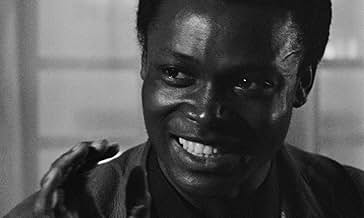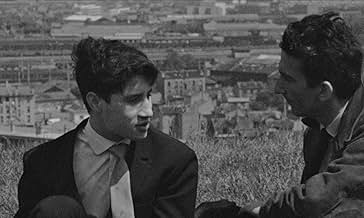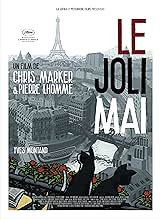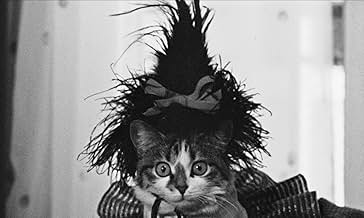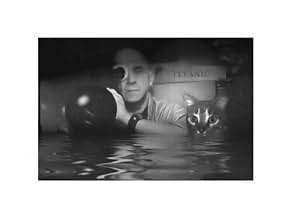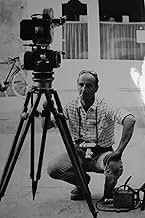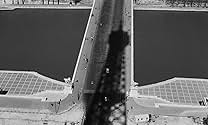Chris Marker and Pierre Lhomme's LE JOLI MAI (The Lovely Month of May) is a portrait of Paris and Parisians during May 1962, the first springtime of peace after the ceasefire with Algeria an... Read allChris Marker and Pierre Lhomme's LE JOLI MAI (The Lovely Month of May) is a portrait of Paris and Parisians during May 1962, the first springtime of peace after the ceasefire with Algeria and the first time in 23 years that France was not involved in any war.Chris Marker and Pierre Lhomme's LE JOLI MAI (The Lovely Month of May) is a portrait of Paris and Parisians during May 1962, the first springtime of peace after the ceasefire with Algeria and the first time in 23 years that France was not involved in any war.
- Directors
- Writers
- Stars
- Awards
- 2 wins total
- Self
- (voice)
- …
- Self
- (uncredited)
- Self
- (uncredited)
- Self
- (uncredited)
- Self
- (uncredited)
- Self
- (uncredited)
- Self
- (uncredited)
- Directors
- Writers
- All cast & crew
- Production, box office & more at IMDbPro
Featured reviews
The best interviews in Le Joli Mai focus on citizens who have experienced conflict. The communist priest was my favorite. I also found the interviews with an Algerian laborer and an African immigrant to be fascinating. The concluding interview with a woman (off camera) in prison grounded the film in reality. Marker is not interested in giving the viewer a picture postcard look at Paris. Rather, Marker digs deeper to show the viewer what tourists do not see and interview people tourists do not meet. It is also clear that the interviewer (Marker, I assume) is taken aback by the political apathy that some of his subjects express. However, the film never takes easy swipes or becomes an ego project the way some more recent documentaries have a tendency to. The funniest moment is when the interviewer tries to convince a salesman to go to the cinema and watch Last Year at Marienbad. Needless to say, the man is skeptical. His taste in film is very different to Marker's more intellectual preferences.
Le Joli Mai, at least in the shortened cut I saw, is not up there with Sans Soliel, but it does deserve to be more widely available in the United States. Perhaps now that Marker is dead, some distributor will take a chance on Le Joli Mai.
After May 1962 the French (like the Germans and Italians) would devote fewer and fewer resources to the military, and more and more to the civilian infrastructure (not just in terms of physical structures, but also in terms of health care, culture, education, social welfare programs to integrate the socially most disadvantaged, etc.). Looking at images of French society and French people in 1962, one is struck by how shabby things appear. That the French have one of the highest standards of living in the world today, higher by most qualitative and quantitative indices than the US, is in no small measure due to the fact that the French have lived at peace for the past 43 years.
Something which cannot be said for the US (I'm writing this shortly after the New Orleans debacle), which begins to look more and more like the shabby country France was in 1962. Marker is, of course, interested in pressing home in his interviews the possibilities that now exist (now = 1962) for greater social solidarity and equality, for going beyond a definition of "happiness" solely in terms of the possession of consumer goods, for free time and "self-realization" (as we used to say in the '60s).
That was not to happen on anything like the scale he would have liked, but it's uncanny that these interviews give us a premonition of the French spring of '68, and the sense that took hold of the Western world for a brief moment that it was possible to press beyond capitalism and create a world in which scarcity would be overcome, all would have enough, and our time would not be given over to dreary necessity but would be truly our time.
Nope. This movie is essentially Chris Marker jerking himself off in front of the camera for nearly two and a half hours. Between the self indulgent 'poems', the still shots which have no coherence, and the utter lack of an interviewing style other than Marker trying to undermine absolutely everything anyone says, it is clear from the outset Marker has no interest in anything other than showing how self important he is.
I enjoy challenging films and documentaries, do not get me wrong. This film, however, is an absolute mess. There is no coherence-- interviews have very little structure, which in many ways is interesting, however, when they serve little purpose other than for the interviewer to undermine his interviewees and impose his 'intelligence' you have a problem. When the interviews are haphazard and uninteresting, the editing rough, 'artistic' shots which serve no purpose other than to draw out the length of the film are prevalent, and an utter lack of rhyme or reason predominate throughout a film you have a serious problem.
There will probably be some people who enjoy this film, and that's okay. I, however, feel as though it was utter vomit.
Did you know
- TriviaAmong personalities viewed in the streets of Paris, this documentary shows directors Jean-Luc Godard (driving his car), Alain Resnais (as a pedestrian) , Jean Rouch (taking a drink in a bar).
- Quotes
Narrator (English version): Why search for beauty in a dove and poetry in poets? When you have owls, painters, cosmonauts, inventors, lovers...
- ConnectionsEdited from Jouer à Paris (1962)
Details
- Release date
- Country of origin
- Official site
- Language
- Also known as
- The Lovely Month of May
- Filming locations
- Production company
- See more company credits at IMDbPro
Box office
- Gross US & Canada
- $55,038
- Opening weekend US & Canada
- $10,662
- Sep 15, 2013
- Gross worldwide
- $55,038
- Runtime2 hours 45 minutes
- Color
- Sound mix
- Aspect ratio
- 1.66 : 1
Contribute to this page



